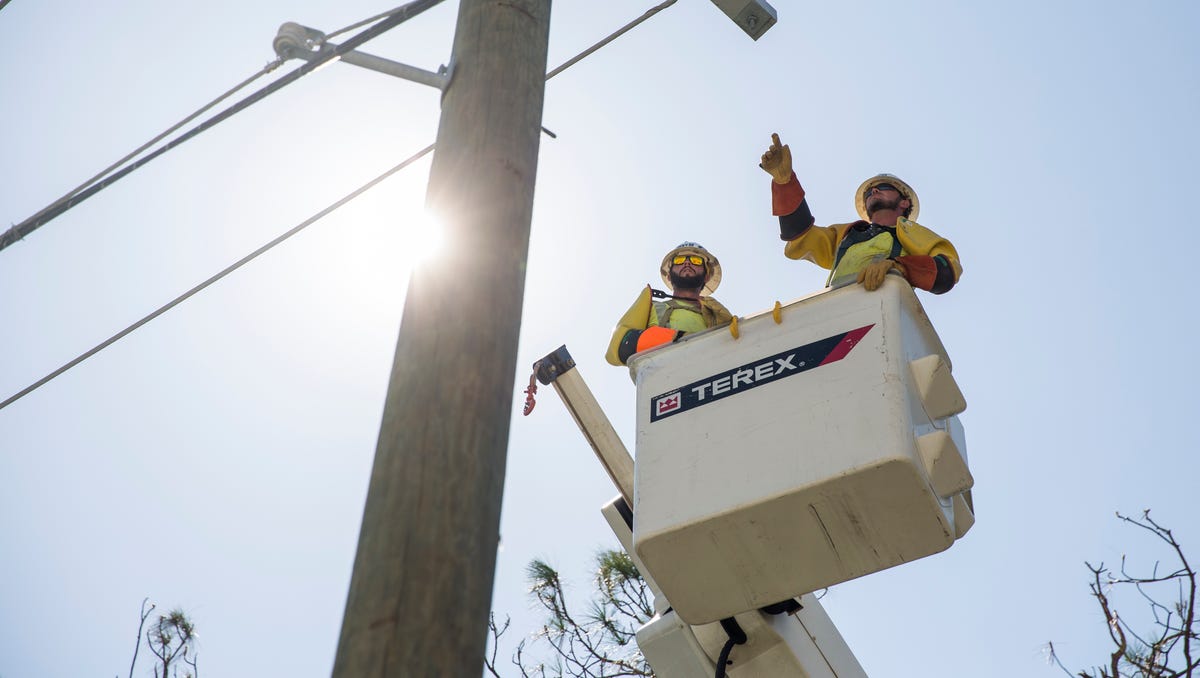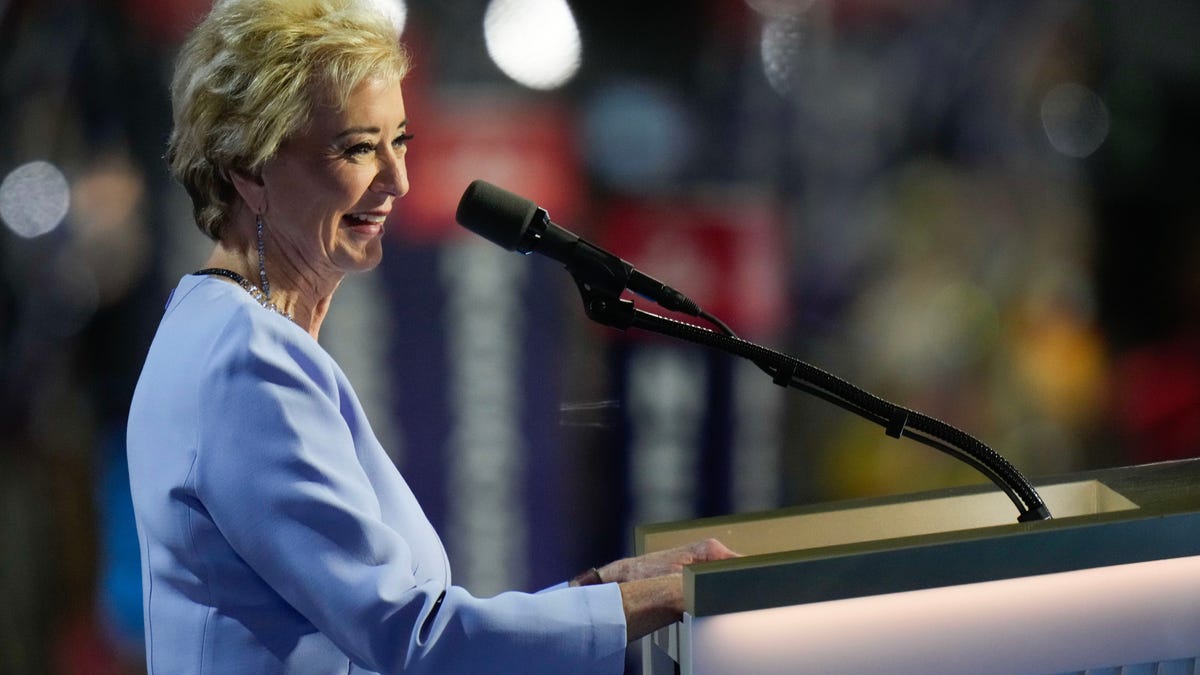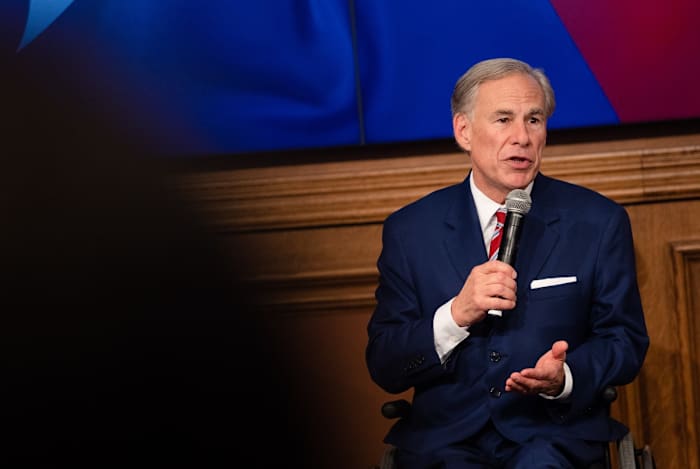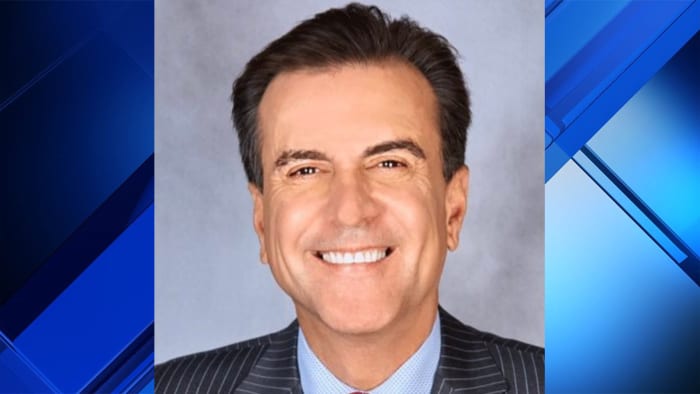Nevada
The Trump Ambassador Who Wants to Run for Nevada Senate on His Record of Retweets

Jeffrey Ross Gunter’s year-and-a-half tenure as U.S. ambassador to Iceland under Donald Trump was, by many accounts, a chaotic mess.
The wealthy dermatologist and GOP donor—who’d never been to Iceland before being confirmed to the post—churned through staff, lashed out at employees, demanded a gun and armed security guards in the world’s safest country, and tried to do the job remotely in California during the pandemic, according to a bombshell CBS News report.
A subsequent report on Gunter by the State Department’s Inspector General found that he threatened to sue embassy employees he perceived as enemies, and alleged that Washington was so disturbed over the situation that it instructed U.S. diplomats in Europe to work directly with Icelandic officials, bypassing Gunter.
Now, Gunter wants to add an even bigger job to his résumé: U.S. senator.
Gunter has indicated to multiple Republican operatives that he plans to challenge Sen. Jacky Rosen (D) in the competitive battleground of Nevada next year, according to a source familiar with the discussions.
It’s unclear when exactly Gunter might launch a campaign, but there’s already a world in which Gunter has spun his disastrous tenure in Reykjavik as a smashing success: a webpage he created to list his “triumphs” as ambassador.
All 122 of them, to be exact.
The first accomplishment is a legitimate one: Gunter oversaw the completion of a new U.S. embassy in Reykjavik during his tenure. But from there, he often measures his diplomatic success more in retweets from Donald Trump and social media view counts than anything else.
On his website, Gunter’s sixth-rated accomplishment is posting a “congratulatory tweet on President Trump’s historic brokering of the Abraham Accords,” which drew “unprecedented engagement” and “stands as Ambassador Gunter and Embassy Reykjavik’s most reacted-to tweet.”
“It was retweeted,” the website notes, “by the President of the United States.”
Gunter’s fifth accomplishment is a July 4th Facebook video he recorded, which purportedly “offered a simple but impactful message of patriotism, shared democratic values, and the deep connection between the United States and Iceland. Reaching over 171,000 people, viewership of this video far eclipsed any other social media post in the history of U.S. Embassy Reykjavik.”
At 80 on the list was Gunter’s creation of “three Facebook videos to inspire people during the COVID-19 pandemic,” which created solidarity between the United States and Icelandic people and inspired many in these difficult times.”
Notably, the reporting on Gunter’s tenure as ambassador revealed his obsession with social media, which was so acute that he would spend hours with embassy staff crafting a single tweet.
Gunter also gives himself credit for performing the most basic duties of an overseas diplomat, like processing passport requests, hosting U.S. officials, and communicating with his Icelandic counterparts. One accomplishment was simply welcoming the Icelandic foreign minister to the embassy. Notably, U.S. citizens in Iceland, and some Icelanders, bristled at Gunter’s performance, with some calling for him to be recalled.
Another Gunter accomplishment: starting a “tradition of ‘light lunches.’”
“Initially launched during the long, dark winters, these lunches (and sometimes breakfasts) continued through the summer, as the COVID pandemic threatened both the community and peoples’ sense of community,” the site reads. “Taking care of the team is key to leadership.”
That line may ring hollow to Gunter’s former team. In his tenure, the ambassador burned through seven deputy chiefs of mission—the top diplomat in an embassy other than the ambassador—firing one simply because he didn’t “like the look of him,” according to CBS News. He also once chewed out a staffer for keeping snow boots under their desk in the Icelandic winter.
The former ambassador’s list of self-identified accomplishments—and the failures he conspicuously omitted from it—is a good encapsulation of why Gunter is not exactly a top-tier recruit for Republicans.
Gunter did not respond to a request for comment through his website.
In Nevada, Republicans will need a strong challenger to Rosen in 2024. Last year’s race between Sen. Catherine Cortez Masto (D) and Adam Laxalt (R) was the closest Senate contest of the cycle, decided by just 8,000 votes. National Republicans have been anxious to claw back a seat in Nevada, and a victory there could easily tip the Senate majority their way.
According to the Nevada Independent, GOP brass has been recruiting Sam Brown, a retired U.S. Army Captain and Purple Heart recipient who unsuccessfully ran for the party nomination in the 2022 Senate race.
The leading declared candidate in the race, Jim Marchant, also worries many Republicans. A far-right former state legislator who lost a bid for Nevada Secretary of State last year, Marchant vocally denied the outcome of the 2020 election and has close links to key figures in the QAnon conspiracy movement.
In a crowded primary field, however, Gunter’s ability to fund his campaign through his own wealth could make him a formidable candidate. A dermatologist by training, he founded national skin clinic chains, with locations in California, Nevada, Arizona, and Texas. He has been a prolific donor to Republican campaigns and causes, giving hundreds of thousands of dollars to them over the years.
That giving is likely what landed Gunter a coveted ambassadorship in the northernmost capital of the world. He donated $100,000 to a super PAC supporting Trump’s 2016 campaign, and donated another $100,000 to Trump’s inaugural celebration. While it’s common for presidents to award certain ambassador posts to donors, Trump nominated an unusually high number of political, non-diplomatic appointees to ambassadorships, particularly those who gave lavishly to his inaugural committee.
But Gunter’s potential Senate bid could be tripped up by ties to the GOP that aren’t totally rock-solid—and ties to his adopted home state that appear flimsy.
For one, he appears to be registered to vote in two different states and with two different parties. In 2021, Gunter registered as a Republican in Nevada, according to voting records reviewed by The Daily Beast. But since 2000, he has been registered to vote as a Democrat in California, which has long been his home state.
Gunter went to high school and college in Berkeley, studied medicine in Los Angeles, and built his dermatology business in the city of Lancaster, just outside of Los Angeles. He has owned property in Nevada since 2007 and owns a home in the town of Pahrump, an hour west of Las Vegas on the border with California.
Gunter’s web site states that he resides in Nevada. But in 2020, during the COVID pandemic, Gunter wanted to work in California rather than return to Iceland, CBS News reported, and would not do so unless then-Secretary of State Mike Pompeo ordered him to. (Pompeo eventually did.)
While the majority of Nevada residents are originally from elsewhere, Marchant has lived in the state since 2005 and Brown has lived there since 2018, though he unsuccessfully ran for a seat in the Texas legislature in 2014.
According to the voter records, Gunter last voted in 2018, in California. There is no record of him voting in the 2020 presidential election, which Trump lost.
In 2022, an election year in which Nevada could have tipped the Senate majority to Republicans, Gunter requested an absentee ballot—from California—but apparently did not return it.
While Gunter gave over $10,000 to committees supporting Laxalt, the 2022 Senate nominee, and $5,000 to the state GOP, he appears to have not cast a vote in an election Laxalt ultimately lost by fewer than 8,000 votes.
Ironically, the 94th accomplishment from Gunter’s ambassadorship touts his efforts to help U.S. citizens in Iceland exercise their rights to vote.
Gunter, his list of accomplishments reads, “helped Americans to register to vote and cast their ballots in the 2020 U.S. elections.”
“Helping Americans in Iceland is a core part of the work of the Embassy and helping them participate in these important elections is an honor and pleasure,” it said.

Nevada
These are five of the best paying jobs in California if you only graduated high school

Looking for a job? Here are some tips to help your search for work
If you are a job seeker, these tips may help you land a new postion.
For more than 5 million Californians, a high school diploma is the highest level of education they’ve attained. That’s enough for these higher-earning jobs.
A 2023 American Community Survey from the U.S. Census Bureau found that, more specifically, about 20% of Californians who are 25 years old or older only have a high school diploma or the equivalent.
It comes amid changing perspectives on the value of higher education, as a Pew Research Center survey found that 40% of U.S. adults say a four-year college degree isn’t too important or “not at all important” in getting a well-paying job.
While California’s minimum wage is $16 — and will remain so as voters rejected a measure to raise it to $18 per unofficial election results – what a Californian needs to make to cover their basic needs is about $11 more.
That’s based on the Living Wage Calculator, which calculates what a person working full time must earn hourly to cover basic needs, including food, housing, and health care, in their area. For an adult with no children in California, that’s $27.32 — based on figures last updated in February.
So, if you’re trying to determine what field to enter, we’ve compiled a list of jobs that typically only need entrants to have a high school diploma or the equivalent. These are jobs with a median hourly wage higher than the living wage for California. Some of these jobs require relevant work experience and on-the-job training.
What are the best-paying jobs in California for people without a college degree?
The following five jobs are among the highest-paying jobs in California from 2022 to 2032, in which only a high school diploma or the equivalent is typically needed to enter the job. This is based on the state’s long-term occupational employment projections data. We’ve also included the total job openings. These figures reflect the projected total job openings, whether from industry growth to people leaving the industry, from 2022 to 2032 to give job seekers a better idea of how competitive it may be to get a foot in the door.
First-line supervisors of police and detectives
For example, police chiefs or police captains, according to ONET, a database for occupational information.
- Total job openings: 5,950
- Median annual wage in 2023 dollars: $167,118
Electrical power-line installers and repairers
- Total job openings: 8,770
- Median annual wage in 2023 dollars: $108,185
Power plant operators
This refers to people involved in operating, controlling or maintaining the machinery generating electricity, not nuclear power, said the Bureau of Labor Statistics.
- Total job openings: 1,880
- Median annual wage in 2023 dollars: $106,370
Petroleum pump system operators, refinery operators and gaugers
This refers to people operating or controlling petroleum refining or processing units, so think industries such as oil and gas extraction or petroleum and coal products manufacturing, according to the Bureau of Labor Statistics.
- Total job openings: 2,330
- Median annual wage in 2023 dollars: $105,203
Correctional officers and jailers
People who guard inmates or may guard prisoners who are in transit to jails or courtrooms said ONET.
- Total job openings: 24,600
- Median annual wage in 2023 dollars: $93,253
Paris Barraza is a trending reporter covering California news at The Desert Sun. Reach her at pbarraza@gannett.com. Follow her on Twitter @ParisBarraza.
Nevada
Air Force Falcons Three Biggest Keys to Defeat Nevada Wolf Pack

The Air Force Falcons are the team with the momentum going into their matchup with the Nevada Wolf Pack on Saturday.
The Falcons and the Wolf Pack kick off at 8:30 p.m. mountain in Mackay Stadium in Reno, Nev. The game is set to be broadcast on FS1.
Momentum is a relative term in this contest. The Falcons (3-7, 1-4) are on a two-game winning streak after they lost seven straight games. But at least they’re winning.
Nevada (3-8, 0-5) has lost its last four games and is trying to salvage what it can going into their in-state rivalry game with UNLV next week.
So how does Air Force win this game? Here are three keys to the contest.
Air Force runs a offense similar to the other service academies that keeps the football on the ground and helps the Falcons dominate time of possession.
Against Oregon State, the Falcons held the ball for more than 42 minutes and enter Saturday’s game No. 14 in the country in rushing yards per game at 209.4 yards per game.
No team has attempted more rushes this season than Air Force’s 554. But the run game hasn’t been as effective as it could be, as the Falcons average less than four yards per carry. So there’s some work to do there.
But, this is a favorable matchup for the Falcons as Nevada is No. 96 in rushing yards allowed per game.
Both teams are struggling with turnover margin.
Nevada enters the game No. 71 in the nation at minus-1. The Wolf Pack has forced 11 turnovers and committed 12. Air Force is No. 88 and the Falcons have forced 11 turnovers and committed 14 turnovers.
The takeaway is that neither team is creating a lot of mistakes this season, which means that one turnover either way can turn this game.
At worst, Air Force wants to break even here. At best, the Falcons want to end up in the positive here, even if it’s by one turnover.
One area Oregon State struggled in against Air Force was in creating first downs. The Beavers had just nine in the game. Part of the reason for that was that OSU went 2-of-10 on third down.
Now, Oregon State was having issues at quarterback, but this is an area where Air Force excels on a national level.
Entering the Nevada game the Falcons are No. 38 in the country in third-down defensive efficiency as they allow opponents to convert 35.1% of the time.
The Falcons’ opponents have converted 40 times on 114 attempts. If Air Force is hoping for a third straight win, getting the Wolf Pack off the field on third down at this rate can help make it happen.
Nevada
Nevada (NIAA) high school football playoffs: 2024 brackets, state championship matchups, game times

Playoff season wraps up in Nevada high school football.
The postseason concludes early next week, as the Nevada playoffs reach the state championship round.
>>Nevada high school football playoff brackets
Stick with High School on SI for all of the matchups, game times and scores throughout the 2024 NIAA football playoffs.
Nevada high school football playoffs 2024 brackets
Here are the Nevada high school football playoff brackets, with state championship matchups and game times from NIAA Classes 1A-5A:
Championship matchup
(1) Bishop Gorman vs. (2) Arbor View
7 p.m. Tuesday, Nov. 26
2024 NIAA Division 5 DI State bracket
Championship matchup
(1) Faith Lutheran vs. (1) Bishop Manogue
1:30 p.m. Saturday
2024 NIAA Division 5 DII State bracket
Championship matchup
(1) Galena vs. (1) Centennial
12 p.m. Monday, Nov. 25
Class 5A Division III state bracket
Championship matchup
Mojave vs. Canyon Springs
3:40 p.m. Tuesday, Nov. 26
Class 4A State
Championship matchup
(1) Sports Leadership and Management vs. (1) Truckee
12:15 p.m. Tuesday, Nov. 26
Class 3A State bracket
Championship matchup
(1) Pershing County vs. (2) Incline
10 a.m. Saturday
Class 2A State bracket
Championship matchup
(1) Tonopah vs. (3) Pahranagat Valley
9 a.m. Tuesday, Nov. 26
Class 1A State bracket
Download the SBLive App
To get live updates on your phone — as well as follow your favorite teams and top games — you can download the SBLive Sports app: Download iPhone App | Download Android App
— Ben Dagg | @sblivesports
-

 News1 week ago
News1 week agoHerbert Smith Freehills to merge with US-based law firm Kramer Levin
-
/cdn.vox-cdn.com/uploads/chorus_asset/file/25724877/Super_Nintendo_World.png)
/cdn.vox-cdn.com/uploads/chorus_asset/file/25724877/Super_Nintendo_World.png) Technology1 week ago
Technology1 week agoThe next Nintendo Direct is all about Super Nintendo World’s Donkey Kong Country
-
Business7 days ago
Column: OpenAI just scored a huge victory in a copyright case … or did it?
-

 Health7 days ago
Health7 days agoBird flu leaves teen in critical condition after country's first reported case
-

 Business3 days ago
Business3 days agoColumn: Molly White's message for journalists going freelance — be ready for the pitfalls
-
World1 week ago
Sarah Palin, NY Times Have Explored Settlement, as Judge Sets Defamation Retrial
-

 Politics2 days ago
Politics2 days agoTrump taps FCC member Brendan Carr to lead agency: 'Warrior for Free Speech'
-

 Sports1 week ago
Sports1 week agoRoki Sasaki’s contract situation, signing process and suitors, explained



















